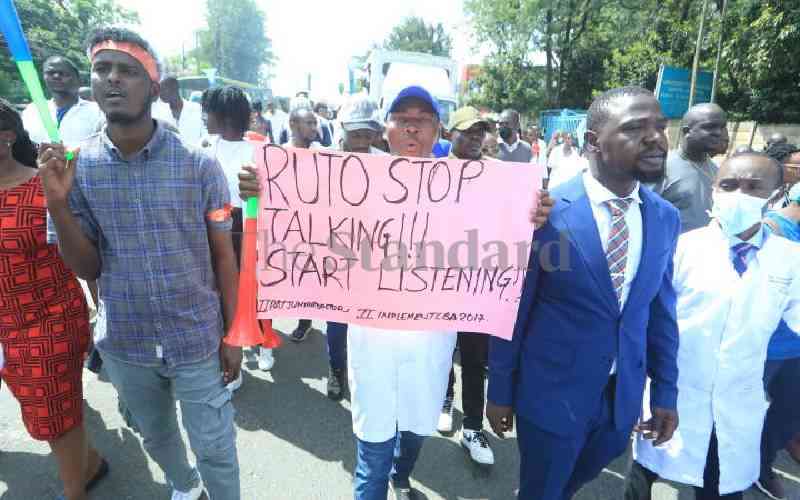Each year, approximately one million Kenyans fall below the poverty line due to health-care related expenditure. Poverty due to diseases, low income, unemployment rates and other challenges further predisposes many Kenyans to disease while at the same time slowing growth.
Despite devolving healthcare, many Kenyans still have difficulties accessing services. Still, many more are forced to choose between health care and other daily basic expenses such as food, clothing and education.
Truth is that many Kenyans are pushed into extreme poverty each year because of out-of-pocket spending on health. A World Bank report on healthcare in the country has shown that only two in ten Kenyans have access to medical insurance. With that in mind, Affordable Health Care- part of the Big 4 Agenda could become President Uhuru Kenyatta’s legacy project. Essentially, the success of UHC is predominantly dependent on the efficiency and effectiveness of NHIF and other related health policies.
Although the pilot project on UHC in Kisumu, Nyeri, Isiolo and Machakos counties targeting 3.2 million Kenyans-with full rollout in all the 47 counties by 2022 may give some direction, more urgent short time measures need to be in place to cushion the poor and vulnerable.
Current trends across the world show that spending on health is growing faster than the rest of the global economy. In fact, a report by the World Health Organization (WHO) notes that the spending accounts for 10 per cent of global Gross Domestic Product (GDP). But that spending is inadequate and the spread of non-communicable diseases deals the same a blow. Several issues should be our concern as a way out of the health challenge.
Improved quality
Kenya needs to focus on equity and solidarity – on raising the bar for health for everyone by addressing existing gaps. What this means is that Kenya should ensure quality, accessible primary health care is the foundation for health coverage. We need to focus on the needs and preferences of individuals, families and communities.
The country needs to focus on health needs that are required throughout life such as screening for health problems, vaccines, information on how to prevent disease, family planning, treatment for long- and short-term conditions. If and when we focus here, we shall finally have a cost-effective and improved quality of care.
Health managers also need to ensure that Kenyans know and are confident of health facilities near them. Most people travel many kilometers to seek for care in referral facilities for minor ailments. Lack of equipment and basic amenities such as water and electricity worsens the situation.
Second, we need to invest more in health education. More often than not, many people suffer from disease or conditions that can be treated if detected early. This is the message we hear all too often in the wrong places; funerals. We need more community health workers to work with communities
Access healthcare
Third, NHIF needs to be revamped to include everyone. It also needs to adopt more innovative and cost- effective ways to capture and help most of the populations in the country access healthcare. It is untenable to have four out of every five Kenyans without access to medical insurance. UHC’s success hinges on adopting more innovative ways of financing the system and carrying along many more as can be.
Fourth, one other solution to reach far-flung areas would be to utilise technology. Tele-medicine remains grossly underutilized in the country. Of course, the problem is the absence of Internet in some areas.
However, a broadband line would be cheaper than building a community health centre and it would provide easy medical assistance and save healthcare costs for patients. Tele-medicine could be used to provide solutions to a problem in real-time remotely without the doctor’s actual presence. Although this does not work for longer-term diseases, but, the majority of problems could be easily dispensed with.
What is certain is that investing in healthcare means a better economic return due to a healthier workforce. Our investment in healthcare would also lead to a qualitative effect of having people leading better lives and ensuring they spend more time at work or with family than in hospital beds. An ill workforce will be quite harmful to our growth agenda.
Stay informed. Subscribe to our newsletter
To make health for all a reality, we need individuals and communities who are well educated about their health, access to high quality health services; skilled health workers providing quality, people-centred care; and a country committed to investing in primary health care.
Prof Mogambi, a Communication and Social Change Expert, teaches at University of Nairobi:[email protected]
 The Standard Group Plc is a
multi-media organization with investments in media platforms spanning newspaper
print operations, television, radio broadcasting, digital and online services. The
Standard Group is recognized as a leading multi-media house in Kenya with a key
influence in matters of national and international interest.
The Standard Group Plc is a
multi-media organization with investments in media platforms spanning newspaper
print operations, television, radio broadcasting, digital and online services. The
Standard Group is recognized as a leading multi-media house in Kenya with a key
influence in matters of national and international interest.
 The Standard Group Plc is a
multi-media organization with investments in media platforms spanning newspaper
print operations, television, radio broadcasting, digital and online services. The
Standard Group is recognized as a leading multi-media house in Kenya with a key
influence in matters of national and international interest.
The Standard Group Plc is a
multi-media organization with investments in media platforms spanning newspaper
print operations, television, radio broadcasting, digital and online services. The
Standard Group is recognized as a leading multi-media house in Kenya with a key
influence in matters of national and international interest.









